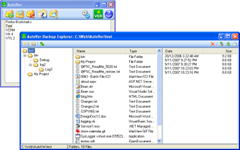AutoVer (windows) gives you easy versioning
October 27th, 2009 by joseAbout two years ago we talked about filehamster. It was  free, unobtrusive, and simpler than doing version control ‘by hand’ (adding numbers to filenames) or ‘by machine’ (using a proper versioning tool such as subversion or mercurial).
free, unobtrusive, and simpler than doing version control ‘by hand’ (adding numbers to filenames) or ‘by machine’ (using a proper versioning tool such as subversion or mercurial).
Well, since then filehamster has moved on to be a pain in the ass. Now the free version nags you a lot, and the paid versions are not really giving us any outstanding features. Plus as a .NET application, it eats up RAM.
Enter AutoVer. Completely freeware, no nags, and a much better interface to boot. The GUI and options make more sense too. I even use it for coding when I’m doing something small and a mercurial repo would be overkill.
Eventually, all writing applications should enable smooth versioning and real-time collaboration (Office 2010 beta does! Wave and etherpad are not alone anymore). The slider that controls versioning as in a time machine is fantastic. AutoVer would not give you that. The AutoVer model also breaks when you send the manuscript to a collaborator, and he edits it on his machine (often changing the file name). Still, it’s much better than not doing versioning at all or doing it by hand.
By the way, does anyone know an alternative that is cross-platform?
October 27th, 2009 at 8:28 pm
For that matter, does anyone know of a similar program for OSX?
October 27th, 2009 at 8:38 pm
I just use dropbox, which does this automatically + backs up my documents online. Note that only the paid version does versioning for more than 30 days.
You can sign up using this link (which also gives me 250 MB extra)
https://www.getdropbox.com/referrals/NTEzODMyMDk
Christoph
October 27th, 2009 at 9:10 pm
I’ve been using Git for this recently – wrote a book with Git’s help, and am managing a decent sized corpus of interview transcripts with it now. The GUI tools on Windows and OSX are good enough that you don’t have to worry about the technical details behind it much, and it’s very low friction in terms of starting a repo and copying it around different systems. Of course, it helps if you keep your work in plain text to get best use out of version control [1]
[1] Of course with Git, you can write a pre commit hook that runs a .doc to .txt converter and commits this in parallel with the main document.
October 28th, 2009 at 10:15 am
Hello,
I use ‘bazaar’ (bzr) for versioning, with the ‘qbzr’ plugin as the graphical interface. Both are cross-platform. I’m currently using it in windows and linux (single repository), for a cross-platform project.
While working on my thesis, I had all the sources (latex, matlab, c, python) in several bzr repositories. You just need some mental discipline to remember to commit the changes, and if branching for a specific feature / quick hack is worthwhile.
October 28th, 2009 at 1:16 pm
I would really like an online tool like Etherpad, only for TeX-files. We use subversion for version control of our TeX-files, but if we are working on the same parts at the same time, we still have to do conflict management which (as far as I know) is a manual hassle. If Subversion had been more real-time-ish, then it could replace the personal version control systems as well, I guess. For me, document often switch status from being person to collaborative and then back again. So for me, any version control system should have collaborative support by default.